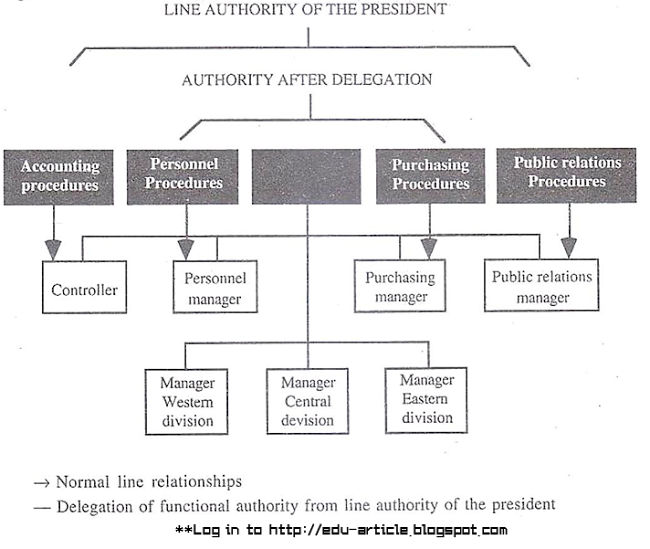Functional authority is the right that is delegated to an individual or a department to control specified processes, practices, policies, or other matters about activities undertaken by persons in other departments.
If the principle of unity of command were followed without exception, authority over these activities would be exercised only by their line superiors.
But numerous reasons — including a lack of special knowledge, a lack of ability to supervise processes, and the danger of diverse interpretations of policies—explain why these managers are occasionally not allowed to exercise this authority.

In such cases, line managers are deprived of some authority. It is delegated by their common superior to a staff specialist or a manager in another department.
For example, a company controller is ordinarily given functional authority to prescribe the system of accounting throughout the company, but this specialized authority is a delegation from the chief executive.
Functional authority is not restricted to managers of a particular type of department.
It may be exercised by line, service, or staff department heads, but more often by the latter two because service and staff departments are usually composed of specialists whose knowledge becomes the basis for functional controls.
The delegation of Functional Authority
One can better understand functional authority by thinking of it as a small slice of the authority of a line superior.
A corporation president, for example, has complete authority to manage a corporation, subject only to limitations placed by such superior authority as the board of directors, the corporate charter and bylaws, and government regulation.
In the pure staff situation, the advisers on personnel, accounting, purchasing, or public relations have no part in this line authority, their duty being mere to offer counsel.
But when the president delegates to these advisers the right to issue instructions directly to the line organizations, as shown in the figure, that right is called “functional authority.”
The four staff and service executives have functional authority over the line organizations concerning procedures in the field of accounting, personnel, purchasing, and public relations.
What has happened is that the president, feeling it unnecessary to clear such specialized matters personally, has delegated line authority to staff assistants (or managers) to issue their instructions to the operating departments.
Limiting the Area of Functional Authority
The functional authority should be carefully restricted to limited functions.
For example, the functional authority of the personnel manager of the general line organization is ordinarily limited to prescribing procedures for the recruiting and selecting of employees but does not include telling departments which candidates are to be selected.
Likewise, a purchasing manager’s functional authority is limited to setting the procedures for departmental purchasing and does not include instructing departments what they can purchase or when.